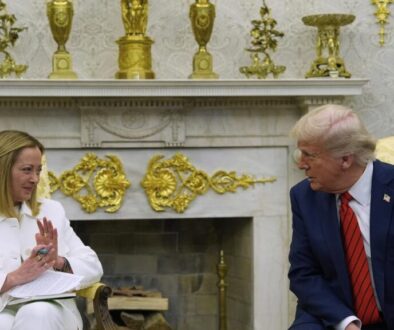Far-Right European Leaders Congratulate Romania’s George Simion for Placing First in Presidential Race
In a major development in Romania’s political landscape, George Simion, leader of the far-right party AUR (Union for Romanian Unity), secured a significant position by placing first in the initial round of the country’s presidential race. This achievement has drawn attention not only within Romania but across Europe, as several far-right European leaders have openly congratulated Simion for his success.
Simion’s rise to the forefront of Romania’s political scene represents a broader trend of far-right movements gaining momentum in Europe. The congratulations from prominent far-right figures across the continent underscore the international ties these movements share, despite varying national contexts. However, Simion’s advance in the presidential race has sparked debates over Romania’s future political direction, especially concerning national identity, immigration, and Romania’s relationship with the European Union.
George Simion’s Rise in Romanian Politics
George Simion is a controversial figure in Romanian politics, having gained prominence as a vocal nationalist and staunch critic of the political establishment. Under his leadership, the AUR party has embraced a strongly nationalist and anti-establishment agenda, appealing to voters disillusioned with the traditional political parties. Simion’s message resonates particularly with those who feel alienated by Romania’s post-communist political evolution and the ongoing European Union integration process.
In the presidential race, Simion’s platform focused heavily on Romania’s sovereignty, national pride, and cultural values. His message has attracted significant support from Romania’s rural areas, which often feel disconnected from the political elite in Bucharest. As a result, Simion has become a polarizing figure, garnering both fervent supporters and vocal critics who worry about the rise of far-right politics in the country.
Support from Far-Right European Leaders
Simion’s success in the presidential race has not gone unnoticed among far-right leaders in Europe. Figures such as Hungarian Prime Minister Viktor Orbán, Italian leader Matteo Salvini, and French politician Marine Le Pen have congratulated Simion, signaling solidarity with his nationalist cause. These leaders see in Simion a political ally with shared values and a common vision for Europe, one that prioritizes national sovereignty, curbs immigration, and challenges the dominance of the European Union.
Orbán, who has positioned himself as a leading figure in European far-right politics, praised Simion’s nationalist stance and his efforts to challenge Romania’s political establishment. Orbán’s Hungary has long been a vocal critic of EU policies on migration and national sovereignty, and his support of Simion reflects the growing alliance between far-right leaders across Europe.
Similarly, Matteo Salvini, Italy’s far-right politician, expressed support for Simion’s success, calling it a victory for populism and nationalism. Salvini, who has championed anti-immigration policies and critiqued the EU’s handling of various crises, sees Romania’s presidential race as part of a larger European shift toward right-wing politics.
Le Pen, the leader of France’s National Rally party, also congratulated Simion, remarking that his rise to prominence is part of a larger wave of populist movements gaining ground across Europe. Le Pen, who has long advocated for France’s withdrawal from the EU and stronger border controls, views Simion’s success as a step toward reshaping the European political landscape in favor of nationalist and anti-globalist ideologies.
The Implications for Romania and Europe
Simion’s strong showing in the Romanian presidential race raises significant questions about Romania’s political future. If he is able to secure the presidency in the second round of voting, his administration could bring sweeping changes to Romania’s foreign and domestic policies. Simion has been a vocal critic of the European Union, and his election could potentially lead to a shift in Romania’s approach to EU membership, especially in areas such as immigration policy and the country’s alignment with EU regulations.
Furthermore, Simion’s victory could signal a larger shift in Romanian politics toward far-right ideologies. This could have ripple effects across Eastern Europe, where similar nationalist movements have been gaining ground in countries like Poland, Hungary, and Serbia. Romania’s position within the EU and its commitment to democratic norms could be put to the test if a Simion-led government seeks to align more closely with other far-right regimes in Europe.
The backing Simion has received from European far-right leaders could also complicate Romania’s relationship with Brussels. The EU has consistently emphasized democratic values, human rights, and the rule of law as core principles for its member states. If Simion’s policies clash with these principles, Romania could face increased scrutiny from EU institutions.
Conclusion
The rise of George Simion in Romania’s presidential race represents a significant moment in the country’s political trajectory. His appeal to nationalist and anti-establishment sentiments has garnered considerable support, particularly from voters disillusioned with Romania’s political elite. The congratulations from far-right European leaders further illustrate the growing influence of nationalist movements across Europe and the increasing solidarity among these factions.
As Romania moves toward the second round of the presidential election, the country’s political future hangs in the balance. Simion’s potential ascent to the presidency could mark a shift in Romania’s national identity and its relationship with the European Union. Only time will tell whether Simion’s brand of populism will reshape Romania’s political landscape or if the nation will maintain its pro-European course.



